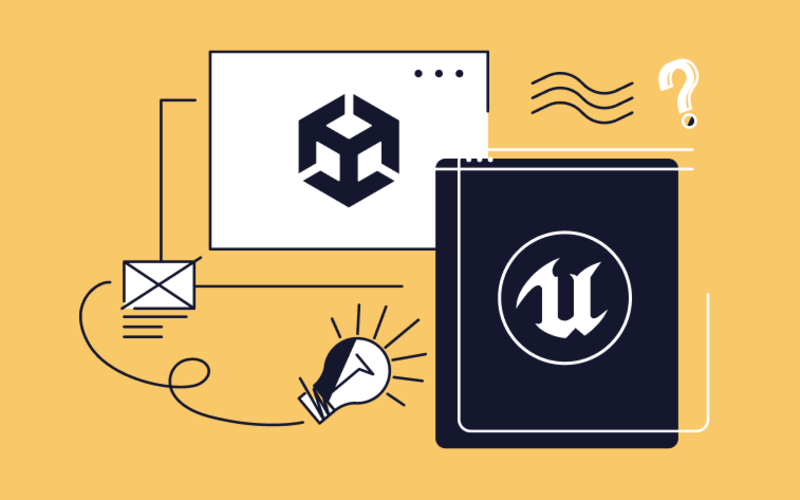NEW
Proxify is bringing transparency to tech team performance based on research conducted at Stanford. An industry first, built for engineering leaders.
Learn more
Software Engineering
Cloud computing
May 08, 2024 · 15 min read
AWS vs GCP: Unraveling the cloud conundrum
This article delves into the intricate details of these two leading cloud service providers, aiming to unravel the complexities and help your business make informed decisions.
Peter Aleksander Bizjak
Mobile & Fullstack Web Developer & Cybersecurity Expert
Verified author
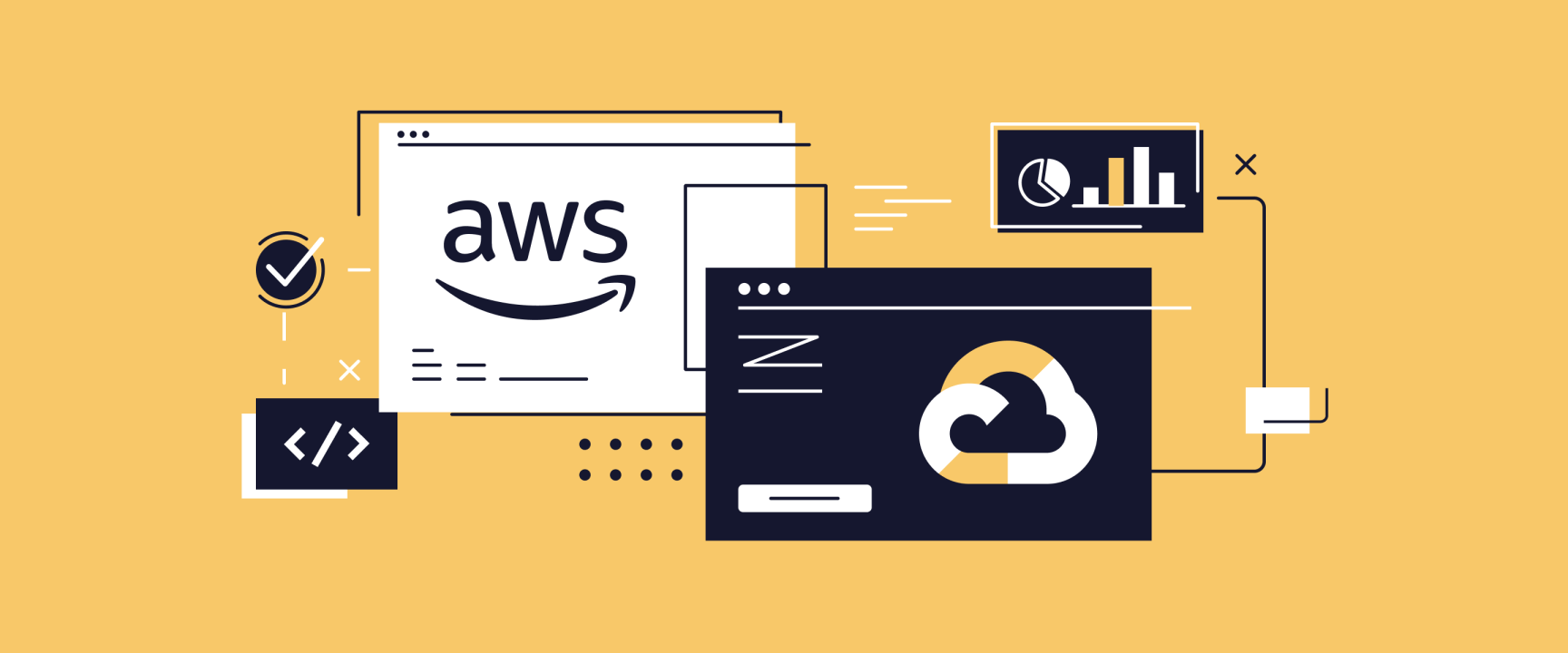
Table of Contents
- Core service comparison
- Compute Services
- Storage services
- Database services
- Big Data and analytics
- AI and Machine Learning
- Conclusion
- Pricing
- Free tier
- Pay-as-you-go
- Reserved instances and committed use discounts
- Key pricing differences
- Staying updated on pricing
- Performance
- Network throughput
- Processing power
- Network latency
- Reliability
- Rule of thumb for choosing between AWS and GCP
- Important considerations
- Security features
- Similar security features
- Distinguishing security features
- AWS security advantage:
- GCP security advantage:
- Considerations for enhanced cloud security
- Unique features
- Unique features of GCP
- Unique features of AWS
- Bonus: comparative analysis for executive decision-making
- Market focus & ideal use cases
- Ease of use
- Community & support
- Final thoughts
- Find a developer
In today's digital landscape, businesses increasingly rely on cloud computing services to drive innovation, streamline operations, and enhance scalability. Amidst the many options available, two giants stand out: Amazon Web Services (AWS) and Google Cloud Platform (GCP).
Core service comparison
Understanding each provider's core services is crucial for businesses to align their infrastructure needs with the right service when evaluating cloud platforms. Below, we compare key services across Amazon Web Services (AWS) and Google Cloud Platform (GCP).
Boost your team
Proxify developers are a powerful extension of your team, consistently delivering expert solutions. With a proven track record across 500+ industries, our specialists integrate seamlessly into your projects, helping you fast-track your roadmap and drive lasting success.
Compute Services
AWS and GCP offer robust, scalable computing services that serve as the backbone of their respective platforms.
- AWS EC2 (Elastic Compute Cloud): Allows users to configure their VMs with a wide array of options for processors, storage, and networking. It's known for its flexibility and wide range of options.
- GCP Compute Engine: Similar to AWS EC2, it provides scalable compute options but is often praised for better pricing models and deeper discounts for sustained use.
Storage services
Storage solutions are essential for data management and scalability in the cloud.
- AWS S3 (Simple Storage Service) is an object storage service with industry-leading scalability, data availability, security, and performance.
- GCP Cloud Storage offers object storage with a simple pricing model. It is often cheaper for outbound data transfers than AWS.
Database services
Managed database services are critical for application data management without the overhead of manual setup and maintenance.
- AWS RDS (Relational Database Service): Simplifies setting up, operating, and scaling a relational database in the cloud. It supports several database instance types, including PostgreSQL, MySQL, MariaDB, Oracle, and SQL Server.
- GCP Cloud SQL: A fully managed database service that makes it easy to set up, maintain, manage, and administer your relational databases on GCP.
Big Data and analytics
Both platforms offer powerful tools for big data processing and analytics that integrate with their respective ecosystems.
- AWS EMR (Elastic Map Reduce): A cloud big data solution for processing massive amounts of data using open-source tools such as Apache Spark, Hadoop, and HBase.
- GCP BigQuery is a serverless, highly scalable, and cost-effective multi-cloud data warehouse designed for business agility. It is known for its speed at query time.
AI and Machine Learning
AI and ML services help businesses leverage data to build intelligent solutions.
- AWS SageMaker: A fully managed service that allows every developer and data scientist to build, train, and deploy machine learning models quickly.
- GCP AI Platform: Integrates deeply with Google’s AI innovations and tools, providing a robust solution for deploying AI models at scale.
Conclusion
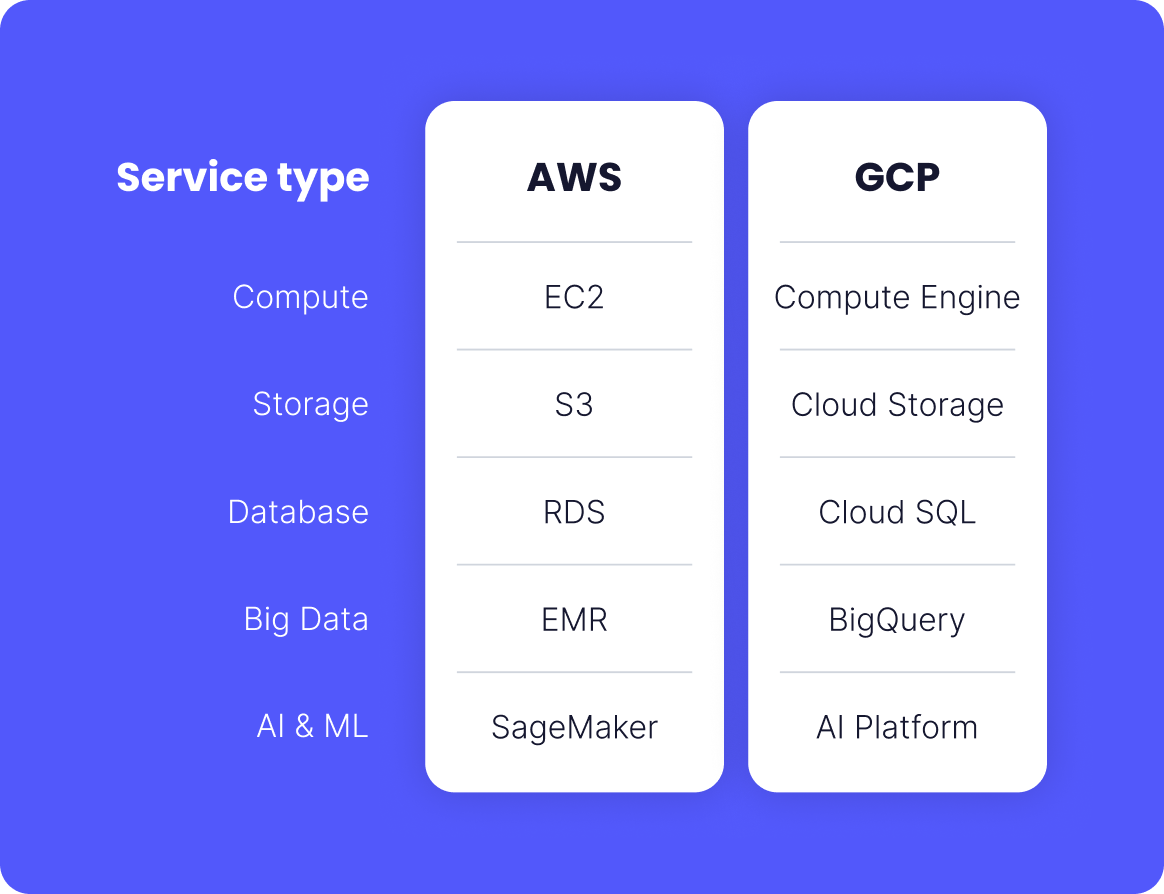
While AWS offers a broader range of services and deeper capabilities in certain areas, GCP provides compelling services integrated with Google's AI and data analytics strengths. The choice between AWS and GCP often comes down to specific business needs, pricing sensitivity, and the technical ecosystem that best aligns with your long-term digital strategy.
Pricing
Understanding the pricing models of AWS and GCP is essential for making cost-effective decisions when migrating to the cloud. Both platforms offer a range of pricing options tailored to different usage patterns, from sporadic development work to high-volume production environments.
Free tier
AWS and GCP provide a free tier option for new users or testing purposes. These free tiers include limited access to many common services, allowing users to experiment with the platforms' capabilities without immediate costs.
Pay-as-you-go
The pay-as-you-go pricing model is standard across both platforms, ensuring you only pay for the resources you use. This model is ideal for projects with unpredictable workloads, providing flexibility and preventing overinvesting of unused resources.
Reserved instances and committed use discounts
For predictable workloads, both AWS and GCP offer ways to save money through reserved instances and committed use discounts:
-
AWS reserved instances: By committing to a specific instance type for a predetermined period (typically one or three years), you can achieve substantial savings compared to on-demand rates. This commitment involves an upfront payment, but the long-term savings can be significant.
-
GCP committed use discounts: Similar to AWS's reserved instances; these discounts apply when you commit to using a set amount of resources across various services. Unlike AWS, GCP's discounts are not limited to compute instances but can include other services, enhancing the flexibility of their pricing structure.
Key pricing differences
When choosing between AWS and GCP, consider the following specifics that could impact your budget:
-
Compute: GCP often offers slightly more cost-effective solutions for compute-optimized instances, whereas AWS may provide better value for general-purpose or memory-optimized instances. It's important to note that similar instance types across platforms may not directly align regarding RAM and processing capabilities, making direct comparisons more complex.
-
Storage: GCP's Cloud Storage typically offers uniform pricing across most regions, simplifying budget planning. Conversely, AWS S3 uses a tiered pricing model based on the volume of data stored and accessed, which might benefit users with large storage needs that fluctuate in access frequency.
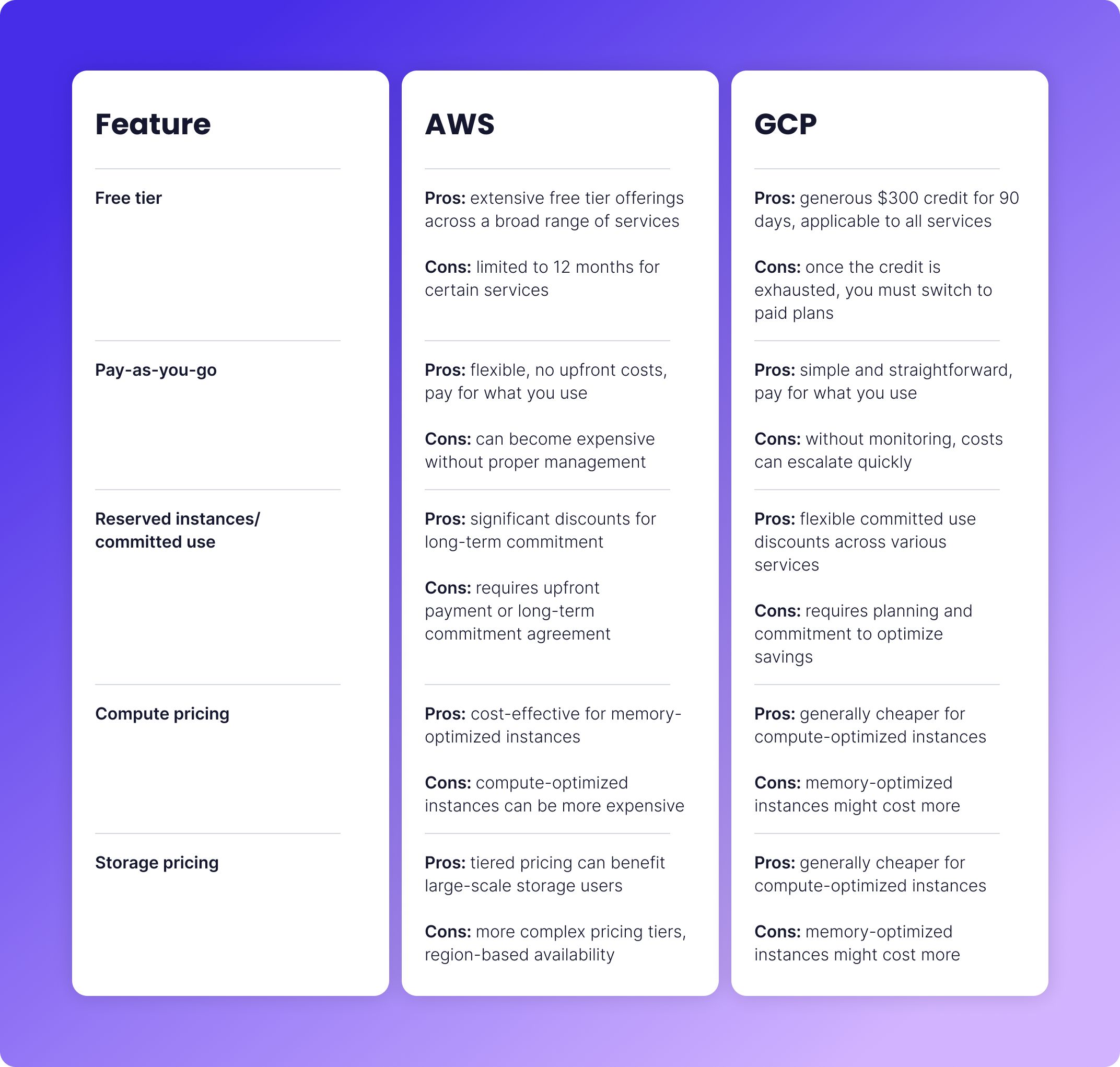
Staying updated on pricing
Please be aware that cloud pricing can evolve, reflecting changes in technology costs, market demand, or the introduction of new services. As such, the prices mentioned here might differ from current rates when you read this article.
It's recommended to refer to the official document of each platform for detailed pricing information:
Performance
Evaluating the performance of AWS and GCP requires looking beyond raw benchmarks, as the context in which these services are used plays a critical role in their effective performance. Here's how both platforms typically stack up regarding network throughput, processing power, latency, and reliability.
Network throughput
- AWS: Known for leading in raw network throughput, its extensive global infrastructure and services like CloudFront bolster it. This makes it an excellent choice for applications requiring high data transfer speeds.
- GCP: Also provides robust network throughput capabilities, though specific benchmarks might show slight variations depending on the region and configurations used.
Processing power
Both offer high-performance computing options. GCP’s custom hardware might edge out AWS in certain compute-intensive scenarios, especially for workloads optimized for Google’s infrastructure.
Network latency
- AWS: Typically has an advantage in network latency, which is crucial for latency-sensitive applications. AWS's maturity and optimization can lead to better performance in real-time applications.
- GCP: Continues to improve latency performance, especially in newer regions where it deploys the latest technologies.
Reliability
Both cloud providers offer solid SLAs and are known for their high uptime, ensuring they remain reliable platforms for mission-critical applications. Although anecdotal, there is an argument to make about the reliability of AWS being slightly less impressive than that of GCP. It's often the case that when AWS experiences problems internally, it affects many clients, especially since its customers are often giant multinational corporations.
Rule of thumb for choosing between AWS and GCP
Choose AWS if:
Your applications demand the highest network throughput. You are already invested in the AWS ecosystem. You need a wide range of services and features. Low latency is critical for your application.
Choose GCP if:
You are focused on cost-effective computing options. Your applications leverage AI and machine learning, particularly with TensorFlow. You prefer using open-source-friendly environments. Custom hardware designs are crucial for your specific workloads.
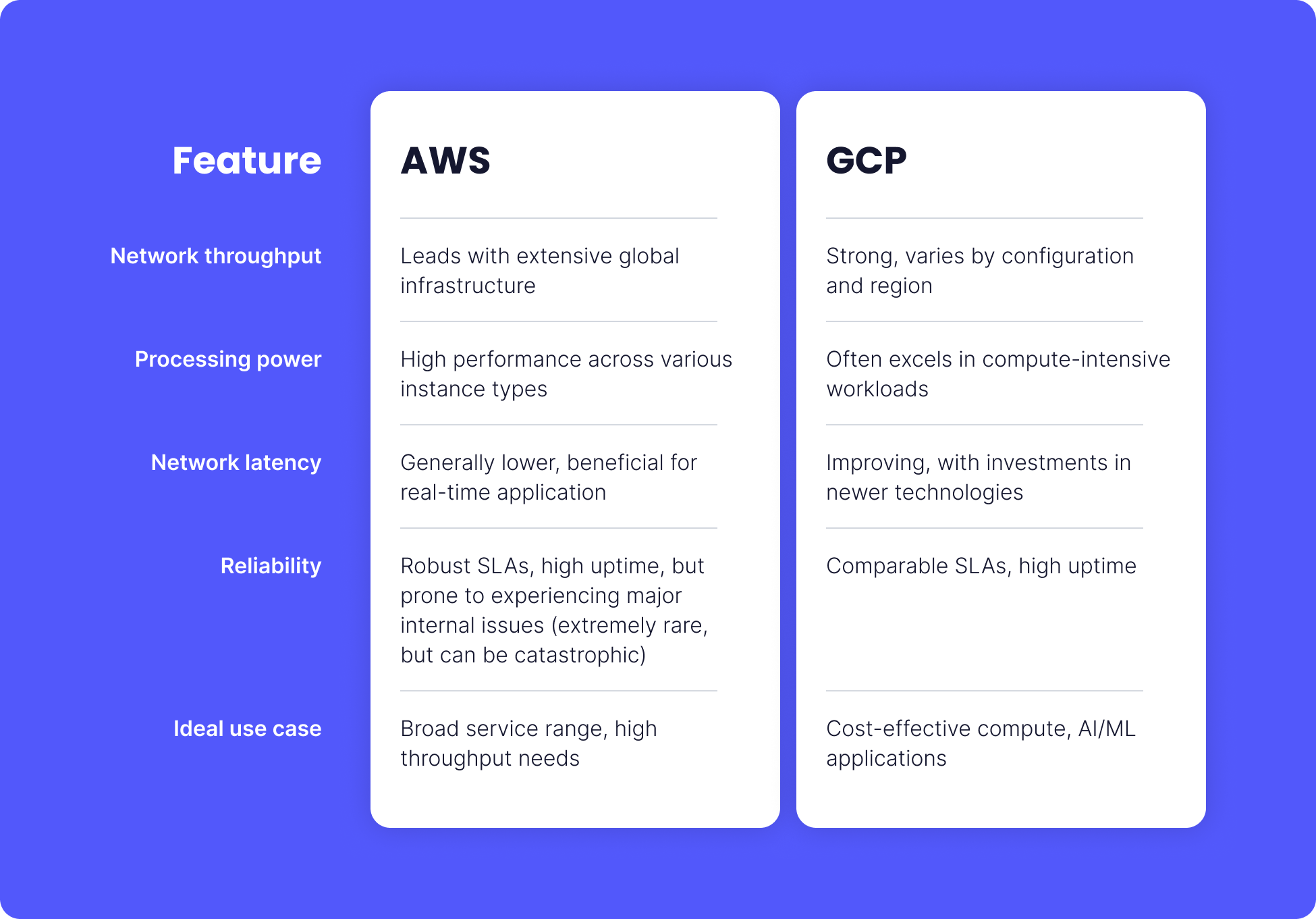
Important considerations
Remember, the best-performing platform depends on your specific needs. Consider factors like:
- Your application's workload characteristics (CPU intensive, memory intensive, network intensive).
- The geographic distribution of your users.
- Your budget and cost optimization goals.
Running pilot tests on both platforms with workloads that closely mimic your real-world use cases is often beneficial. This hands-on approach will provide the most accurate performance data relevant to your situation.
Security features
Security is a paramount concern in cloud computing. AWS and GCP offer comprehensive security features to securely protect and manage your data and applications. Understanding the similarities and differences in their security offerings can help you choose the right provider based on your specific needs.
Similar security features
AWS and GCP both provide a robust suite of security tools designed to protect your cloud resources:
- Identity and Access Management (IAM): Both platforms offer granular control over user permissions, ensuring only authorized users can access specific resources.
- Encryption: Comprehensive options for encryption at rest and in transit are available to safeguard data from unauthorized access.
- Security best practices: Each platform adheres to high standards and compliance with various global security standards, helping customers meet their compliance requirements.
- Threat detection and mitigation: Advanced monitoring services detect and mitigate potential threats, providing continuous security assessments and actionable insights.
Distinguishing security features
While both platforms provide excellent security features, each has unique tools that might be particularly advantageous depending on your security needs.
AWS security advantage:
- Amazon inspector: An automated security assessment service that helps improve the security and compliance of applications deployed on AWS. It automatically assesses applications for vulnerabilities or deviations from best practices.
- AWS WAF (Web Application Firewall): Protects web applications from common web exploits that could affect application availability, compromise security, or consume excessive resources.
GCP security advantage:
- Google Cloud Key Management Service (KMS): Allows you to manage cryptographic keys for your cloud services like you do on-premises, with centralized control over key management.
- Chronicle: GCP's security analytics platform is designed to scale with enterprise security needs, providing threat detection, investigation, and a robust response toolset.
Considerations for enhanced cloud security
When deciding between AWS and GCP, consider the following additional points to enhance your security posture:
- Compliance requirements: Both platforms offer extensive compliance coverage; however, review the specific certifications each holds to ensure they align with your industry's regulations.
- Security expertise: Assess your team's familiarity and comfort with each platform's security tools. This can significantly impact the effectiveness of your security strategy.
- Security best practices: Adhering to security best practices is crucial regardless of the chosen platform. Regular audits, consistent policy enforcement, and ongoing staff training are essential to a robust security strategy.
Unique features
When choosing between AWS and GCP, understanding the unique offerings each platform brings can guide developers and businesses toward the best cloud solution for your specific needs. Here's an overview of some standout features that differentiate these two cloud giants:
Unique features of GCP
Firebase: GCP's Firebase is a robust mobile application development platform that streamlines the integration of crucial functionalities such as user authentication, real-time databases, analytics, and cloud functions into mobile apps. With comprehensive SDKs available for multiple development platforms, Firebase is an indispensable tool for mobile developers.
AI/ML Integration: GCP is renowned for its seamless integration with Google's cutting-edge AI and ML technologies, including TensorFlow. This integration provides a powerful platform for developers to build advanced ML-driven applications using pre-trained and custom machine-learning models tailored to their needs.
Serverless technologies: GCP emphasizes serverless computing with offerings like Cloud Functions and Cloud Run, enabling developers to deploy applications without the overhead of managing servers. This focus significantly simplifies application scaling and maintenance.
BigQuery: As a serverless, highly scalable data warehouse, Google Cloud BigQuery excels at handling massive datasets for analytics. Its user-friendly SQL-like query interface makes it a top choice for organizations seeking extensive data analysis with minimal setup.
Unique features of AWS
Amazon Kinesis: AWS provides exceptional capabilities for real-time data processing with Amazon Kinesis. Ideal for applications that require the ingestion, analysis, and processing of streaming data, such as IoT or live event monitoring, Kinesis helps businesses make quicker, data-driven decisions.
AWS Lambda@Edge: This innovative serverless computing service allows code to be executed at the edge of AWS's global network, significantly reducing latency for applications requiring immediate data processing close to end users.
Amazon Detective: Leveraging machine learning technology, Amazon Detective makes it easier for security teams to analyze, investigate, and quickly respond to security issues. Automating the analysis of security data enhances the ability to understand and act on potential threats efficiently.
Amazon Sumerian: Unique in its offering, Amazon Sumerian allows developers to create immersive and interactive 3D, VR, and AR applications quickly, even without specialized programming knowledge in these technologies.
Bonus: comparative analysis for executive decision-making
When deciding between AWS and GCP, you must consider various factors beyond technical capabilities, such as market focus, user experience, and community support. Here's an overview of these aspects to guide strategic cloud decisions.
Market focus & ideal use cases
AWS is primarily enterprise-focused, targeting large organizations with complex infrastructure needs. It handles large-scale applications, mission-critical workloads, and extensive hybrid cloud deployments. This makes AWS ideal for organizations that require a comprehensive suite of services to address diverse and demanding requirements.
While increasingly focusing on enterprises, GCP traditionally caters to startups and developers. It is solid in machine learning, AI, big data analytics, and serverless computing. GCP's cost-effective and scalable solutions suit innovative projects and cost-sensitive deployments.
Ease of use
The ease of navigating and managing cloud platforms can significantly impact adoption and satisfaction.
AWS presents a steeper learning curve due to its breadth of services and configuration options. This complexity might overwhelm smaller teams or those new to cloud infrastructures.
GCP offers a more streamlined interface and is often considered more straightforward, especially for developers and smaller teams. Its focus on core functionalities and user-friendly design promotes better manageability and faster deployment cycles.
Community & support
A robust community and comprehensive support are crucial for leveraging cloud technologies effectively.
AWS boasts a large, well-established developer community supported by many tutorials, documentation, and third-party resources. Its support structure is highly developed, with tiered support plans designed to meet various organizational needs, from startups to large enterprises.
GCP has a rapidly growing community, especially popular among developers for its commitment to open-source and collaborative tools. While its free support tier provides basic access, paid support plans offer more extensive resources, including faster response times and access to technical account managers.
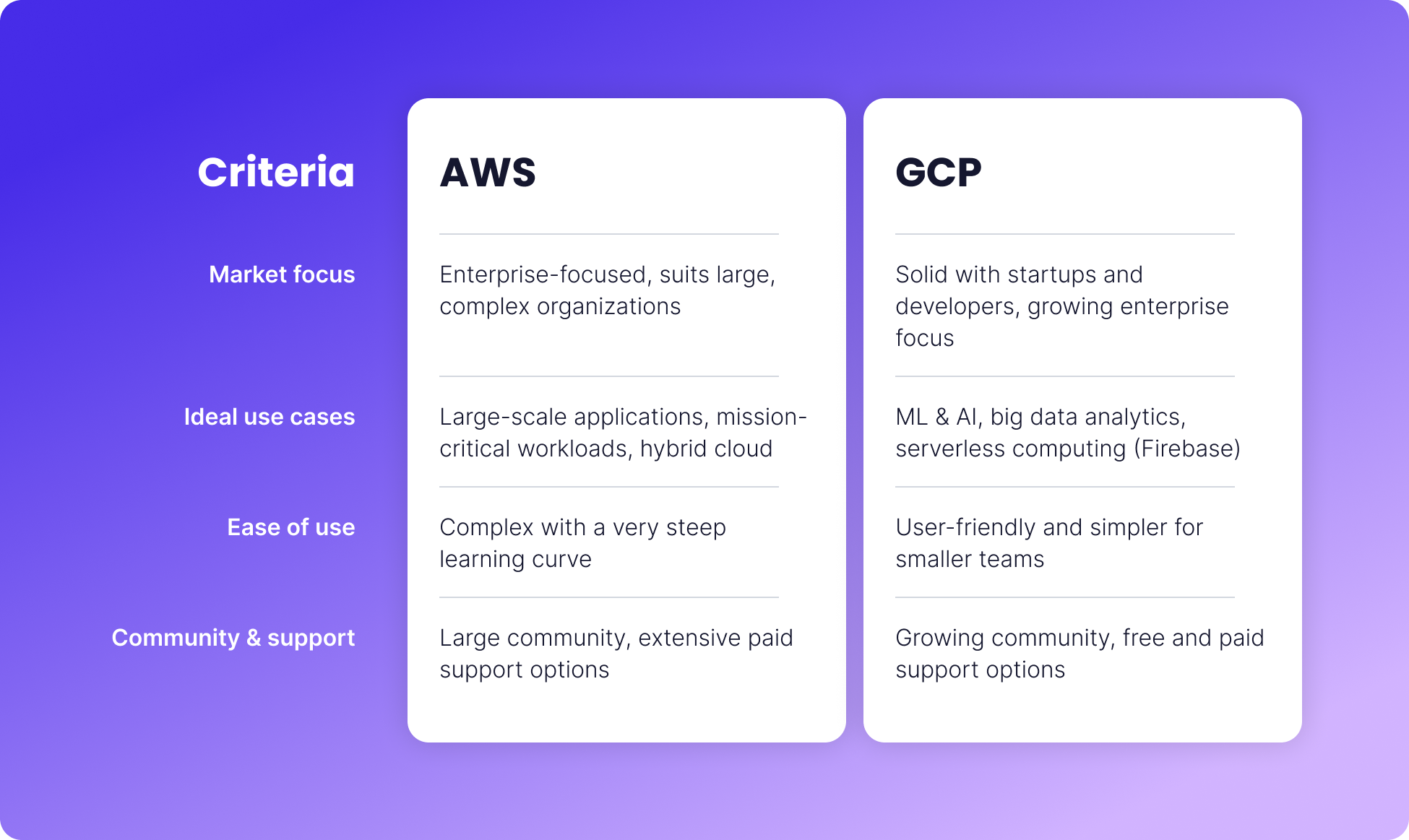
Final thoughts
Choosing between AWS and GCP should align with your company's size, technical demands, and strategic goals. Consider conducting pilot projects or consulting with experts to understand which platform aligns best with your business objectives and team capabilities. Ultimately, the right cloud provider should fit your current needs and scale with your future growth and innovation strategies.
Was this article helpful?
Find your next developer within days, not months
In a short 25-minute call, we would like to:
- Understand your development needs
- Explain our process to match you with qualified, vetted developers from our network
- You are presented the right candidates 2 days in average after we talk

